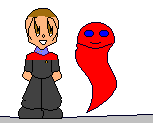Originally posted by skritsys
A good example of a bad scifi flick and you can take your pick from SciFi, but there are plenty of crappy science fiction stories where they totally ramble on about some tech that makes no sense.
One that sticks out in my head is an old B+W flick I saw at a movie marathon called The Giant Claw. About some giant bird almost Rodan-like that looked more like Gonzo and they tried to take it down with anti-matter bullets. And they had to generate some bio-electric field to make the bird vulnerable and it was powered by a wall socket.
One that sticks out in my head is an old B+W flick I saw at a movie marathon called The Giant Claw. About some giant bird almost Rodan-like that looked more like Gonzo and they tried to take it down with anti-matter bullets. And they had to generate some bio-electric field to make the bird vulnerable and it was powered by a wall socket.






 Why even watch TV if a military title, which is most likely used because of tradition, bothers you just because it's not 100% accurate based on physics?
Why even watch TV if a military title, which is most likely used because of tradition, bothers you just because it's not 100% accurate based on physics?
Comment